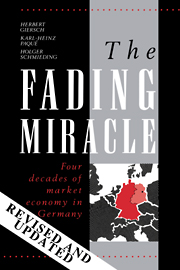Book contents
4 - 1960–1973: towards managed growth
Published online by Cambridge University Press: 09 February 2010
Summary
For most industrialized countries of the Western hemisphere, the 1960s and early 1970s were a golden age, with economic growth reaching its post-war peak. For West Germany, things look slightly different. As to unemployment the situation was very healthy, since a state of full or over-full utilization of the country's stock of capital and labour could be preserved for about one and a half decades – interrupted only by one major sharp recession in 1966/7. As for economic growth, however, the period looks more like a time of transition from the economic miracle of the 1950s to normal international standards and – from a historical perspective – to the secular growth slack of later years. The same holds true for the more qualitative category of structural change: while the economy still relied heavily on the successful export engine which had been at the heart of the German miracle in the 1950s, the need for structural adjustment away from the export orientation was increasingly felt all over the period.
That West Germany's economic transition went along with a gradual sociological and political transformation may be more than sheer historical coincidence: step by step the paternalistic conservatism of the Adenauer years gave way to a mixture of liberal openness and tolerance in lifestyle and a new wave of socialist thinking in intellectual discourse.
- Type
- Chapter
- Information
- The Fading MiracleFour Decades of Market Economy in Germany, pp. 125 - 184Publisher: Cambridge University PressPrint publication year: 1992



